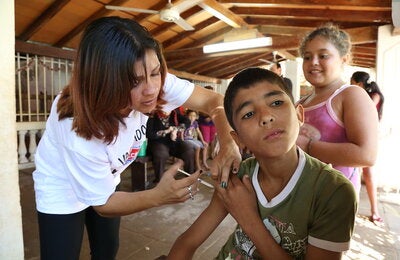Panama City, Panama, 17 May 2016 (PAHO/WHO) - The International Day against Homophobia and Transphobia, observed each year on May 17th, aims to draw attention to the violence and discrimination lesbian, gay, bisexual, transgender and intersex (LGBTI) people experience globally. Never before have the concerns of LGBTI communities in Latin America and the Caribbean been so visible. LGBTI people in many countries in the region are increasingly speaking out about their challenges surrounding safety, health, justice, inclusion and human rights. While we celebrate this progress in the region, we call attention to the lack of response in some countries to barriers faced by LGBTI people.
LGBTI people too often are excluded from legal protections, rejected by families and communities and lack equal treatment in schools, workplaces, health care settings and the streets. Multiple forms of discrimination increase their social exclusion, affecting their mental health and vulnerability to sexual and gender-based violence, HIV, other sexually transmitted diseases and other violations to their right to the enjoyment of the highest attainable standard of health, which creates barriers to universal health.
A 2016 global report by the Trans Murder Monitoring project indicated that 78% of violent deaths of transgender people between the 1st of January 2008 and the 30th of April 2016, from the 65 countries that reported, took place in Latin America.1 In most countries, several studies have begun to show homophobic and transphobic violence in the education system. The overall bullying prevalence may range between 40% and 70%3. Violence in the school environment increases the risk of depression, substance abuse and suicide.2 In Latin America between 44 and 70% of transgender women have been put out of their homes or felt compelled to leave. Lesbian women are vulnerable to physical and emotional violence in their communities. Intersex people are subjected to sex or genital reassignment surgeries without their consent and most of these procedures cause irreversible damage.
Because of their increased vulnerability to violence and other forms of persecution, LGBTI people are at heightened risk of forced displacement. When they flee their countries of origin in search of refugee status they are often not recognized as needing international protection, and frequently suffer violent crimes during migration journeys, such as killings, death threats, illegal detentions and sexual and gender-based violence.
A 2014 UNAIDS survey of men who have sex with men in the Caribbean4 revealed that approximately three of every five respondents had been verbally abused or intimidated. Almost one in five had experienced physical abuse. Four percent said they had been hit or beaten within the last month.
HIV statistics also tell a story of deep vulnerability. Depending on the country, Caribbean men who have sex with men are between six and twenty times more likely to be living with HIV than people in the general population. HIV prevalence among transgender women in Latin America ranges from 10 to 32%.5 Stigma and discrimination make it difficult for many people to access quality, gender-responsive health services. In Latin America, for example, only half of men who have sex with men have access to HIV services.6
LGBTI Rights and the 2030 Agenda
The Sustainable Development Goals provide a roadmap for the community of nations to end poverty, hunger and inequality; improve access to health and education; and achieve peace and justice for all. It is impossible to achieve equitable societies if segments of our populations are deprived of their human rights, dignity and opportunities that are to be universally accorded to everyone, and upheld by State and non-State actors.
In addition, in 2013 the Pan American Health Organization (PAHO) Member States adopted a Resolution on addressing the causes of disparities in health service access for LGBT people. The resolution recommends different actions to Member States in order to reduce stigma and discrimination in health services and ensure universal health for LGBT people.
Next month, the United Nations Member States will gather in New York at the High Level Meeting on HIV to articulate a Political Declaration to commit to ending the AIDS epidemic by 2030. Here we have another critical opportunity to ensure that efforts to end AIDS leave no one behind.
Agenda for Action
What can this region do to address both formal and informal discrimination?
It is important to remove laws and policies that discriminate on the basis of sexual orientation, gender identity or gender expression and to pass laws and policies that ensure equal access to education, employment, health, housing, social protection and justice.
It is critical to uphold the rule of law by investigating, prosecuting perpetrators, and providing redress for the victims of sexual and gender-based violence and discrimination, as well as providing protection to those who have been forcibly displaced due to LGBTI- related persecution.
Education sectors should strengthen their response to school violence based on sexual orientation and gender identity/expression through documentation of the problem, appropriate policies addressing discrimination of all kinds, teacher training, curricular reform and services for affected students.
The health sector should enhance equitable access to all healthcare services for LGBTI people.
All public policy development should include the active and meaningful participation of LGBTI people. Civil society, faith communities, the media and LGBTI networks and people themselves have a part to play in ensuring that all people are treated with dignity and respect.
The United Nations agencies in Latin America and the Caribbean are committed to supporting the region on all these issues to reach the Sustainable Development Goals for peace, justice, human rights, gender equality and development, without leaving anyone behind. All United Nations agencies are united under the "Free & Equal" global public education campaign in support of LGBTI equality.
*OCHA, PAHO/WHO, UNAIDS, UNFPA, UNDP, UNESCO, UNICEF, UN WOMEN, UNHCR, UNV.



